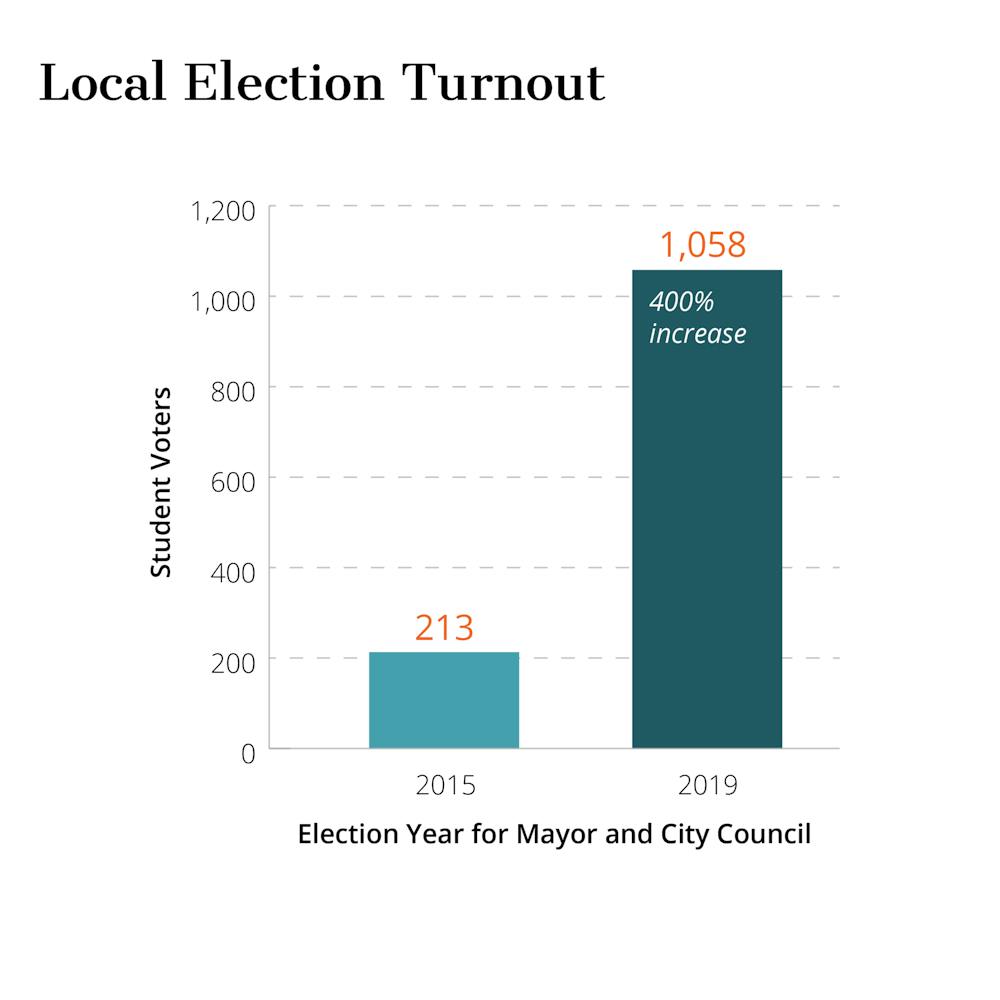
Voter turnout on campus increased five-fold from 2015, the year of the last mayoral election, according to Penn Leads the Vote data released Wednesday.
On Tuesday, at least 1,058 students voted for mayor and city council positions. In November 2015, only 213 students voted on election day.
Philadelphians re-elected incumbent Democratic Mayor Jim Kenney and upended City Council's two-party dynamic by voting in a progressive third-party candidate, marking the first time since 1980 that a third-party candidate or independent won a city-wide election.

In Philadelphia's City Council system, five at-large seats are essentially reserved for the majority party — currently the Democratic Party — as each party can put up a maximum of five candidates.
This leaves two at-large seats left over for candidates in the minority party, seats which have traditionally been occupied by Republicans. This year, the Working Families Party, a progressive independent party, succeeded in winning one seat, while Republicans also won one seat.
Benjamin Oh, Penn Leads the Vote co-director and graduate student in social policy, said progressive policies, like Medicare for All and the Green New Deal, likely played a role in increasing voter turnout.
"These really visionary policies that have been proposed on the national level help students conceptualize how the issues politicians, national and local, deal with on a daily basis really influence their lives," Oh said. "A lot of students have said, 'I want to vote because I believe in this policy and I want to show support for it.'"
While turnout in local elections has sharply risen in recent years, it pales in comparison to voter turnout in last year's midterm election. Data from Penn Leads the Vote shows that 8,426 students voted in the 2018 midterms.
“Interest in engagement doesn’t really translate into local politics,” Oh said. “There was one year where there were some of the precincts that had zero voters, or just one voter who showed up to vote for the entire day.”
Penn Democrats President and College junior EJ Carlson said Penn Dems encouraged voter turnout via a Facebook page, personal texts, and the group’s voter guide.
“Not only do we post all over our social media that it is Election Day, but we also provide a lot of resources to our members and the Penn community,” she said. “If they see that people are passionate about who is running, there is more incentive to go out and vote.”
"Voter turnout was substantially larger this year, but unfortunately these voters did not fight for improved city governance," College Republicans Communications Director and Wharton sophomore Corey Paredes wrote in an email to The Daily Pennsylvanian.
WFP candidate Kendra Brooks won one at-large City Council seat on Tuesday, with fellow party candidate Nicolas O'Rourke narrowly losing out on the second minority party at-large seat to a Republican incumbent.

Photo Credits: Allan Domb by Steven M. Falk/The Philadelphia Inquirer, Helen Gym by Jose Moreno/The Philadelphia Inquirer, Kendra Brooks by Baidi Wang/The Philadelphia Inquirer.
Oh said increased civic participation by students played a role in bolstering the campaign of Brooks.
"Our ward actually gave Kendra Brooks the second-highest number of votes out of any of the wards within Philadelphia," Oh said. "That is a signal students, almost more than any other demographic group, really care about the issues that are at hand now."
Carlson said Penn Dems didn't endorse the WFP candidate but the group hosted Brooks and O'Rourke at a club event. And even without an endorsement, the Penn Dems voting guide featured the two candidates, in an effort to inform members of their candidacies.
She said the WFP's strength was a sign of establishment politics losing power in the city.
"The fact that the Working Families Party was able to get so many votes, and pull votes away from Democrats, in order to get their own seats, that's notable," Carlson said. "It's definitely a signal that the Democratic machine in Philadelphia is getting a little bit weaker, for better or for worse."
Randall Miller, a Saint Joseph's University history professor who specializes in Philadelphia politics, said the city clearly experienced a notable leftward shift during this election cycle. As a result, Miller said establishment Democrats are under pressure to shift their ideology towards the extremes.
"The Democrats can't simply assume because we control everything, we can do anything we want," Miller said. "There has been a real progressive push the last several years."
Miller also said while it was unusual for third-party candidates to do so well, Brooks and O'Rourke were able to capitalize on strong campaigns to have a strong finish.
"There was external money to help these candidates," Miller said, referencing the hundreds of thousands of dollars Brooks raised — the most of any Philadelphia third-party candidate in history. "The candidates were well organized."
The Daily Pennsylvanian is an independent, student-run newspaper. Please consider making a donation to support the coverage that shapes the University. Your generosity ensures a future of strong journalism at Penn.
Donate






